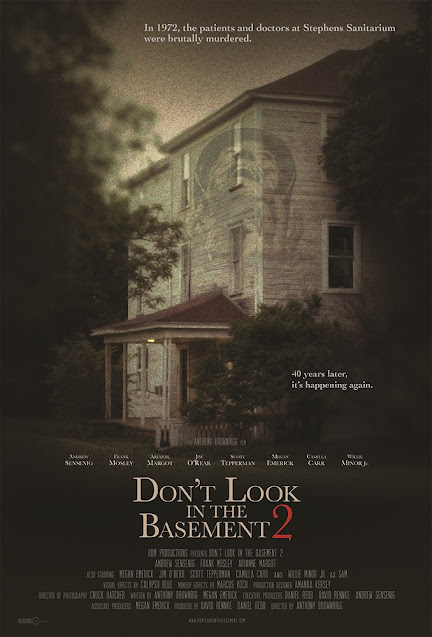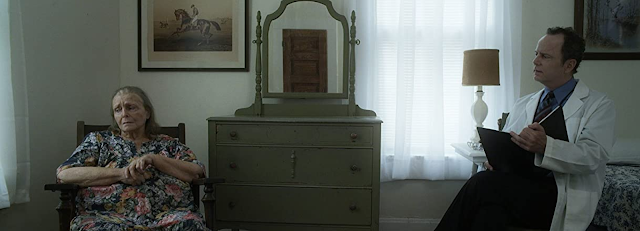By Bradley Steele Harding
In 1973, a small independent horror film shot in Texas
quietly began playing regional runs on the drive-in circuit. Originally
released to little success under its shooting title, The Forgotten, it was subsequently sold using such disparate
monikers as Death Ward 13, Beyond Help and The Snake Pit. It eventually found its largest audience as Don’t Look in the Basement, a
provocative yet ambiguous declaration that audiences found too irresistible to
resist. The new title was helped greatly by an ad campaign lifted directly from
the previous year’s Last House on the
Left, which proclaimed, ‘To avoid fainting, keep repeating: it’s only a
movie…’ It was often paired with that Wes Craven classic on a popular double
bill that played successfully for several years throughout the US.
Basement revolved around the exploits of
several eccentric patients at the secluded (and woefully understaffed)
Stephen’s Sanitarium. Subjected to an unorthodox experimental therapy, they are
encouraged to live out their individual psychoses as a pathway to a cure.
Things go awry after a therapeutic session turns violent and a new nurse begins
to unravel the terrible secret (indirectly related to the declarative title).
The film’s sweaty, claustrophobic aesthetic and memorable performances from a
game, if unpolished, cast helped contribute to its devoted cult following
through the years.
 |
| THE SNAKE PIT was one of the many alternate titles for DON'T LOOK IN THE BASEMENT. |
It was the first
theatrical film directed by Larry Buchanan protégé S.F. Brownrigg, who would go
on to make a series of popular Texas lensed horror films. Throughout the ‘70s
the indie filmmaker made such drive-in mainstays as Scum of the Earth (1963) and Keep My
Grave Open (1977). Utilizing a cast and crew of local talent, the late Brownrigg
cultivated a company of dedicated individuals who ensured a level of professionalism
with each film. For years the director attempted to get a sequel to Basement into production, but was never
able to line up the appropriate deal. After his death in 1996, Brownrigg’s son
Tony, a respected filmmaker in his own right, also tried to get a follow-up off
the ground. Yet despite the original film’s success and subsequent cult
following, interest in a second chapter was difficult to generate.
It wasn’t
until recently that Tony was finally able to secure financing for a trip back
to the basement. Starring Andrew Sensenig (We Are Still Here), Frank Mosely (The Ghost Who Walks) and Arianne Martin, it's a true sequel to the original film that incorporates ideas S.F. Brownrigg had for a follow up. Similar to what Blumhouse did with Halloween 2018, Basement 2 honors the original by going back to the source material. The original shooting location and original Basement actor Camilla Carr are back - as well as pivotal characters from the '73 film. Most intriguing of all is the casting of exploitation icon Libby Hall, the star of Larry Buchanan's The Naked Witch (1964). Hall, who is Tony's mom and was married to his late father, has a supporting role as a patient in the sequel.
After playing the festival circuit a few years ago and receiving
positive buzz, Basement 2 found a distributor
with indie outfit Legless Corpse Films. The boutique distribution company
released the eagerly-awaited title on DVD. A more recent Blu-ray release, packaged with the original Basement, was released through Brink Vision. It is also available to stream on Amazon Prime. I
caught up with Tony while he was still deep in
post-production for the long-in-development sequel.
What was the impetus
for making a sequel to Basement 40
years later?
Dad had always wanted to make a sequel. He and Bret McCormick in the late 80’s had gotten together and were working on a sequel
then. Bret McCormick was the director of Replicator
and a bunch of 80’s low budget films that came out. It was the 80’s so it was very
much ‘a group of teenagers go to X location and one by one are killed by Y.’
But he could never get it financed… Never get it off the ground. He tried for
years to get it going and throughout that time he and I would talk about the
things that he wished he could have done. So he spent a lot of time reminiscing
about the first one and his thoughts on what he could do for a sequel. And when
he passed away he was still trying to come up with a way to get Basement done. It wasn’t long after
that, that I decided that I wanted start trying to get it done myself.
So there’s actually a
script of a slasher version of Basement 2
floating around?
There is somewhere. Where I have no clue. But I know that
there’s one out there somewhere. I read it and it was very much a style of
movie that was popular in the day, which was, you know…
A typical slasher
movie?
Yes, it was very much a Friday
the 13th kind of, you know… they show up and one by one they’re
killed by spirits in the house. And so originally what they were trying to do
is that the ghosts of the original characters were killing these teenagers that
had come to stay in the old house, the old haunted house.
It took you fourteen
years to finally get a sequel off the ground. How did you approach a follow-up
for the modern horror audience?
Some time had past, it’s now in the 2000's you know. The
market’s different, the audiences are different... So I took a lot of things
that dad had wanted to do in the first Basement.
Then (co-producer and star) Megan Emerick and I sat down and worked on a new
script utilizing a lot of the original things dad had wanted to do on a sequel
(as far as the original characters are concerned). And make it a true sequel
about the continuation of what happened to Sam. That’s partly based on the fact
that dad had always regretted that the film ended with Sam just sitting there.
He wished there had been more of a resolution.
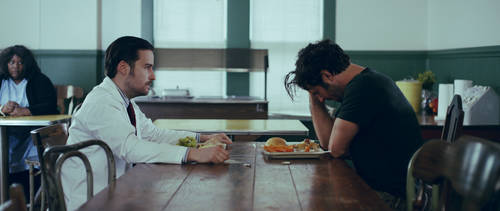 | |
| Dr. White (Frank Mosley) confronts Clive (Brady McInnes) in DON'T LOOK IN THE BASEMENT 2. That's Dawn McGhee (daughter of Bill McGhee, the star of the original BASEMENT), in the far left. |
So this new script
was partially informed by the story elements your father wanted in the original
film - as well as themes he wanted to explore in a sequel. Are there any ties
to the slasher script from the 80’s?
No, this is a thriller and it’s funny that’s something else
that Dad had said at one point. He says ‘You know, now-a-days,’ and this was in
the 80’s that he’s talking about it, ‘now a days the first Basement really isn’t even a real horror film, it’s more of a
thriller. When you look at it there’s really not a whole lot of blood in it.’
And there isn’t, except for the ending scene, you know, and there’s some people
that get stabbed in the eye and well, I mean, violence-wise it could almost
play like a Disney film...
So you would
characterize Basement 2 as a true follow-up
to the original film?
It is definitely a true sequel. It’s a true sequel in a more
realistic matrix. I didn’t want to do a film that would try to outdo the first
one - in the same vein, where it’s just like the first one, only more. ‘Cause
that would be competing with Dad - and I didn’t really want to compete with
Dad. So we used the first film as historical reference. These events really
occurred in this building, with these characters, in 1972 and now a new clinic
owns it, modern day, people have cell phones… All the patients there aren’t
just quote unquote “crazy,” they actually have real ailments now-a-days:
schizophrenia, you know, severe bi-polar, you’ve got people with various forms
of dementia, Alzheimer’s, that kind of thing. So we tried to keep this as this
realistic clinic in the modern day that had this event happen in 1972. And then
we add the paranormal into it… When Sam arrives to this clinic weird things
start to happen.
Without giving too
much away, what is the basic plot line for Basement
2?
There is a new doctor there. He’s more of the audience’s
guide. He’s the regular doctor who’s there who has to figure all this stuff
out, ‘cause weird things are happening. Sam is still Sam. He is now in his 70’s
but he is still the mind of a ten-year-old. He is relatively unchanged and
Willie Minor plays him now because unfortunately we lost Bill McGhee a few
years ago. Will did a great job reprising the role of Sam. He really is a
protagonist in the sense that he’s still, as he was in the first film, he
really is an innocent. He always was. And it’s hard to believe, for a new
doctor to believe, that this guy killed all these people. He doesn’t seem like
the kind of guy who could do all of that, you know? And the bizarre occurrences
that start happening when Sam arrives lead the doctor to start digging. There’s
a real story behind this and hopefully he can figure it out before the events
that are unfolding get to such an extreme that they take him down with him -
and the other patients.
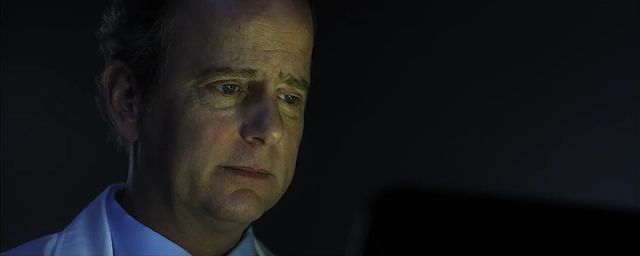 |
| Andrew Sensenig (WE ARE STILL HERE) plays Dr. Matthews in DON'T LOOK IN THE BASEMENT 2. |
Andrew Sensenig plays
the new doctor.
We were lucky to get Andrew. He is extremely busy. He had
just come off Upstream Color and
several other horror films and we had a small window to be able to bring him in
and have him play the role. He did a fantastic job. He plays the doctor from
New York that’s decided to get away from the big city. He’s running from
something himself and winds up taking this job at a little clinic in the middle
of nowhere thinking that he can just kind of vanish, you know… And it turns out
that’s not the case.
Don’t Look in the Basement 2 is your second genre film (after
2008’s Red Victoria). Did your dad’s
films inspire you as a filmmaker?
I was so young when Dad did them, I didn’t even get to see
them until the 80’s. But I already knew so much about horror at the time just
working around Dad. I love the fact that dad really explored, at the time, a newer
genre, which was the drive-in splatter. Especially Poor White Trash, which I love, and Basement, which I love. And as much as Dad loved (them) I was lucky
enough to have all the inside scoop from him as to what things he wanted to
change or wished he’d changed. Every filmmaker looks at their film after
they’re done and goes, ‘I wish I’d done that different or I wish I’d changed
that differently.’ And so what I loved more than his films was Dad’s tenacity
to want to get it right. That’s what I admired even more than the films, which
I loved. But I admired his tenacity to never give up on trying to make it
right… better.
Your father got you
started in production at an early age.
Oh, yes… I was a
young child with a father who was a producer and director so that equated to me
being free talent and free crew. And that was utilized often so I got a lot of
training when I was very, very young. My first set was when I was about ten.
10-years-old and he had me gripping. Then when a commercial would come around
that needed a child in it he would put me in it. So I got experience in front
and behind the camera, which was a lot of fun. All the ButterKrust Bread spots in the ‘70s… I was like the ButterKrust Kid in all these commercials that he
was doing.
Your father is known
for working with a dependable stable of cast and crew. While working on his
commercials did you come into contact with a lot of them?
No, I did not. Now Annabelle Weenick (who played Dr.
Masters) was my acting coach growing up. I did take acting lessons from
Annabelle for quite a while. I loved Annabelle... In the late 80’s I did a play
with Sharon Bunn from Keep My Grave Open
and Larry O’Dwyer from Don’t Open the
Door and Hugh Feagin from Basement.
So I did a play with all three of them at Theater Three and it was a lot of
fun. I was already in my 20’s at that point so I got to ask all the questions
that I’d never gotten to ask before about back from the day. Because you only
hear so much from your father. Your father tells you the things he wants you to
hear.
It’s been said that
Annabelle (who died in 2003) was instrumental in putting Basement together.
From what I have heard, Annabelle and Gene Ross (who played
Judge) would go out and re-write scenes. They kind of acted as on-the-set writers
when something wasn’t working or a scene wasn’t working. Annabelle and Gene
would go out and re-write something and then work with the actors, then bring
it back in and Dad would direct it. But, yes, from what I have heard Annabelle
was very instrumental in working on the script. Camilla Carr who was in Basement wound up being the script
supervisor and acting at the same time. It was that low budget a production.
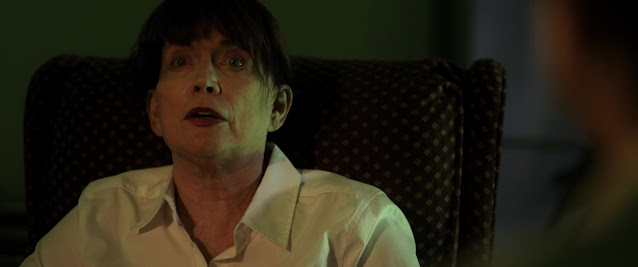 |
| Camilla Carr, who played Harriet in the original BASEMENT, returns in the sequel playing Emily, a different character. |
Carr, who played
Harriet in the original Basement, has
a role in the new film. Did you approach anyone else from the original cast?
I had talked to Camilla years ago about the possibility of
bringing her in for a sequel. And she was interested then. A lot of the actors
have either moved on or some of them… the guy who played Danny (Jessie Kirby) –
can’t even find him. Of course, Annabelle’s passed on… and several of them have
passed on. Hugh Feagin, he’s doing theater right now. Bob Dracup, we were
trying to find a place for Bob but we just couldn’t find a good place for him.
But yeah, I talked to a bunch of the cast members that I could find at the time
– and most of them expressed interest and definitely a genuine love for dad.
Which really made me feel good.
Were you able to
contact Rosie Holitik (who played Nurse Charlotte)?
Yes. Well Rosie’s very successful in real estate now a days.
She has a different life now. Like many actors that leave the business it’s
kind of something you put behind you. So, it wasn’t really something she was
interested in. But we do actually find out what happened to her (character) in
the new script. We don’t just leave her out. It will be a definite surprise.
The sequel takes
place in the same location used in the original film (the Trinity Institute in
Tehuacana, TX). Had you ever visited the building prior to shooting?
Yeah, I actually went in the late 80’s with Dad when he was
trying to get his sequel going. He visited the place and I went with him. So I
kind of toured the house for the first time in the late 80’s with Dad. And Dad
kind of let me know, ‘Oh this is where we shot this and this is where we did
this’ and I already knew the film at that point. It was a really neat feeling
to be able to walk around and say, ‘Oh, yeah, this is where, you know, this
scene happened and that scene happened…’ The fact that it is still here in 2014
is even more amazing.
It must have been
surreal, especially for actress Carr, going back there 40 years later…
Yes. It was a great experience for her. You kind of walk
around kind of starry-eyed for the first few minutes when you see the staircase
and you see the first floor of the upstairs. Then you go into room 4, which is
where the murder occurred in the first film. That’s the only room like it in
the whole building. The only room structured like that… It’s like ‘Oh, yeah,
this is where Dad directed this. This is where, you know…’
It’s hard to believe
it’s still standing.
It’s very hard to believe it’s still standing. It actually
is part of a Texas landmark, the Trinity Institute, which is the old
Westminster College. What a lot of people don’t know is that the building is
not just by itself in the middle of nowhere. There’s a gigantic five-story
college not three hundred feet from that building. That building is actually
the dormitory for the college. The college is from the 1800’s, it’s very old
and falling apart. The caretakers are trying to actually raise funds to
renovate because it is a landmark. So we’re hoping we can do a little
documentary about, not only this film, but about the location itself and maybe
try to help them raise some funds to get the college renovated.
As the writer, director
and star of Red Victoria, which
revolves around a writer who is reluctant to take on a horror movie, I have to
ask – are you a fan of horror movies?
I am a fan of horror movies in this sense: I enjoy and love
the psychology behind them. Because of my upbringing with a horror director I
was creating special effects make-up at ten. Putting gashes on my friends and
blood and all that other good stuff. So not a lot scared me, especially in the
movies because I knew how they were made. One of the reasons I did Red Victoria was because at the time I
wasn’t able to get Basement off the
ground. I had tried for a while and I was talking to a distributor who said,
‘Why don’t you do a horror film?’ I was like, ‘No, I’ve tried that, Dad did Basement and you know I don’t really
want to try to walk in his footsteps… so I want to do a comedy.’
He tried to
talk me into it and I said, ‘Alright, I’ll do a horror film about a guy that
doesn’t want to make a horror film.' That’s what Red Victoria was, it was really my frustration in the fact that
horror is considered by many to be so easy to make and it’s not. It’s actually
very hard. That’s why the lead character in Red
Victoria kind of looked down his nose at horror. It’s the opiate of the
masses, it’s cheap thrills… And at the end of Red Victoria he wound up coming to realize what true horror is…
Which is really fear of being out of control either by an external source or an
internal source. And that’s something that I find fascinating about horror.
